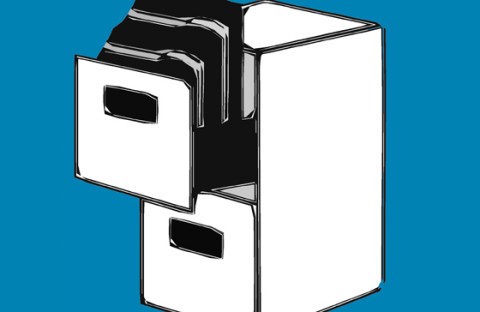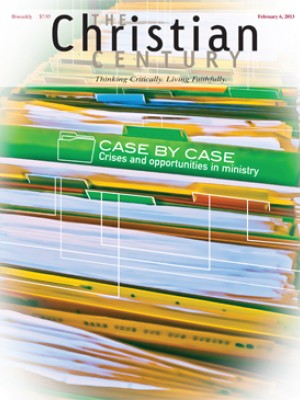Unwanted publicity: Case by case

Congregational life presents a broad range of conflicts and dilemmas in which theological and ecclesial issues are entwined with the complex drama of human relations. Such challenges are also moments in which Christian witness can be clarified. This fictional narrative, which is followed by an analysis, is the first in a series.
Thomas Windham looked around the circle and felt truly glad to be these people’s pastor. “I think it’s important to start with a prayer,” he said. “Everything we’ll do here today is a prayer, but let’s start it with words.”
He began, “O God, we’ve come in our work clothes on this beautiful autumn day to help one of your children whose home needs a wheelchair ramp. We pray it’s a blessing to Addie Sikes and a help to her daughter who takes her to doctor’s appointments. We’re grateful for your moving Lee Martin to lead this project. Thank you for letting us be part of your work. In the name of Jesus, who taught us to serve others, Amen.”
Read our latest issue or browse back issues.
Thomas was sincerely grateful, especially since Lee Martin was one of the last parishioners he would have expected to suggest such an activity. While their denomination was considered relatively liberal, Lee was a bank executive who had more in common with the conservative culture of their area. Lee belonged to Lakeview Church because he’d married into it.
Lee’s wife, Elizabeth, came from a family who’d founded Lakeview Church in the 1800s, and she supported their traditionally progressive stance. Everyone in the congregation loved her. Lee occasionally got crosswise with other members, most recently over a parking issue. Thomas had heard that Lee was interested in running for local office at some point, but he had a hard time imagining how Lee and Elizabeth’s home life might be affected, given their different philosophies and the inevitability of Lee’s taking stands with which Elizabeth couldn’t agree.
Thomas considered himself a moderate both theologically and politically, but he knew that Lee regarded him as a liberal. When Thomas encouraged the congregation to get involved in justice issues, or even mercy ministries, Lee often made patronizing comments. “Pastor, I’m sure you mean well, but you just don’t understand how the world really works. People usually get what they deserve.”
But on this particular day, Lee seemed totally involved in the church’s project of helping someone who needed assistance. Thomas thought it was really too bad that Elizabeth wasn’t there to see it—she’d been out of state for several weeks, helping her sister adjust to a medical diagnosis that would require major life changes.
Thomas had spent most of his 30 years as a student or in jobs that didn’t require much skill with his hands. After seminary, he served four years in a small-town congregation. He had moved to Lakeview Church nine months previously, and he and his wife were delighted to be city dwellers again—in a small city, yes, but one large enough to have some amateur theater and where his wife could find employment as a kindergarten teacher. They also found suitable schools for their children, one in second grade and the other in preschool.
Unlike Thomas, Lee enjoyed carpentry and had done some well-executed projects around his house. He had even come over one weekend to repair a playhouse in the parsonage’s backyard so Thomas’s children could use it. Thomas watched, impressed, as Lee got the crew at Mrs. Sikes’s house quickly and efficiently organized. He had recruited three employees from the bank to help and seemed to get along with them well.
Around 3:30, an SUV bearing the local television station’s logo pulled up across the street. A young reporter wearing a suit and tie got out, as did the driver, a comfortably dressed woman who went around back and pulled out a camera.
“Hey, the news folks are here,” said a volunteer.
“I wonder how they found out,” Thomas responded. He walked across the yard toward them, thinking maybe this would make service projects more appealing to the congregants who were always talking about the need to “raise their profile” in the community to attract new members.
Thomas introduced himself to the reporter, Chad Collins, a young man with astonishingly white teeth, and learned that he had come at Lee’s request. “We’re in the same civic club,” Chad said. The videographer suggested, “Let’s do the first interview right here, Chad. I can get a good background of the project from this spot.”
“Your wish is my command,” Chad responded, eliciting an eye roll from the woman, who set up her tripod while Chad wrote Thomas’s name and title in a notebook. Once the camera was on, Thomas explained the project, giving the credit to Lee and other volunteers from the church and the bank. He also spoke about his belief that following Jesus meant taking care of people who needed help.
Then they walked toward the house, where Chad spoke with a longtime church member who echoed what Thomas said. Addie Sikes’s daughter wheeled Addie out to the porch, and they were emotional as they expressed their gratitude. Thomas felt a little guilty for thinking about the story’s benefit to the church.
Then the reporter said, “Lee, you’re up.” To Thomas’s shock, the three bank employees surrounded Lee and held up signs which one of them had just fetched from his car. They read “Vote Lee Martin—A Mayor Who’ll Understand.” Lee shed a denim overshirt, revealing a T-shirt with the same slogan.
“Wait! What are you doing?” Thomas demanded. “You can’t use a church project to launch a political campaign!”
“Well, you thought it was fine when you and a bunch of our members went to that DREAM Act rally because you want to let those illegals stay here. How is that not political?” Lee shot back.
“It’s about an issue, not a candidate. It’s not partisan,” Thomas tried to explain. “It’s legislation that folks in both parties support.”
“Hogwash! Everybody knows it’s designed to get the Hispanic vote!”
Thomas was beginning to feel desperate. “Look, we’re not going to come to an agreement on the DREAM Act right now. The real issue is that using this event to announce a campaign is completely inappropriate.”
“That’s your opinion,” said Lee, “and you’re wrong.”
“I’m sorry, Pastor,” Chad said, “but you’re going to have to move. We have First Amendment rights, and you can’t stop me from doing a story.” He told the videographer to start shooting and thrust his microphone at Lee.
“This project demonstrates the reason I’m running for mayor,” Lee said, looking at the camera. “Government shouldn’t be taking care of people like Mrs. Sikes. Private charities and churches should do this work. I’ll encourage this kind of private initiative.”
When they finished, Thomas went to the car with the reporter and asked him not to use the story. When it became clear that the reporter intended to air it and quickly—“I’m going to have it on the air at five o’clock”—Thomas begged him not to use his own comments. “I want to make them off the record,” he said. “Oh, my boss is really clear on that,” Chad replied. “You have to tell me it’s off the record before you say it. And Saturday’s a slow news day, except for sports. We need a long story, and you’ll definitely be on the air.”
Thomas looked back at Lee, now laughing with his employees, who were shaking his hand and slapping him on the back. The church members were gathered across the yard from them, speaking together in low tones and wearing expressions that clearly showed they were upset. Fortunately, the ramp was all but finished, and by the time Thomas had said goodbye and had a prayer with Addie Sikes and her daughter, he and the church members were free to leave.
He felt sick as he drove home. “I’m an idiot!” he burst out the moment he entered the parsonage. As he dashed for the remote, he moaned, “Why did I think Lee Martin might be doing this for an unselfish motive? I should have known better. It was my pride. I thought my sermons had inspired him. What a prideful idiot.”
While he waited for the news, he told his wife, Jenny, what had happened. The story wasn’t the lead story, but it was near the top, and it was just as bad as Thomas had feared. When he was younger, the moment would have been gone, but now his DVR let him replay the segment time and again. No matter how he tried to construe it, the story made it appear that he and the church had staged the project to support Lee’s political campaign.
Jenny asked, “Doesn’t he realize you could lose your tax exemption over that?”
Thomas just stared at her. Now that she’d said it, it was obvious, but he hadn’t even considered that aspect of the issue and couldn’t help feeling that it was among the least of his problems.
The parsonage phone rang, and he blurted out, “Don’t answer it.” Jenny did, though, and stepped out of the room. He began watching the story again. Then Jenny came back, saying, “You should take this. It’s the manager of the TV station.”





